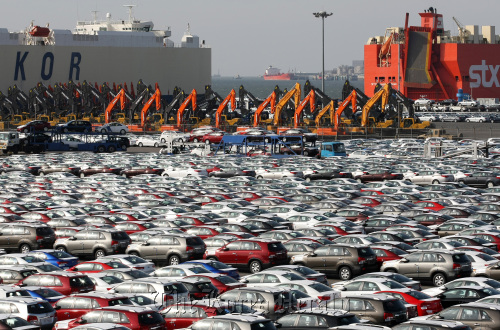Auto parts makers likely to directly benefit from free trade pact
Korean carmakers and auto parts makers are expected to be the main beneficiaries of the nation’s free trade agreement with the European Union, which took effect on July 1.
Hyundai Motor and its affiliate Kia Motors operate a plant with an annual production capacity of 300,000 units within the EU, whose output is mostly sold around the region.
Direct effects may be relatively small as vehicles produced within the EU are already exempt from tariffs, which was part of the reason for building plants there.
“But the benefits will by no means be as small as tariffs on parts are being removed,” a government official said.
“And as most of the vehicles shipped from Korea are models not produced at European plants, the pact will allow Hyundai and Kia to strengthen their lineup,” he said.
Korean carmakers and auto parts makers are expected to be the main beneficiaries of the nation’s free trade agreement with the European Union, which took effect on July 1.
Hyundai Motor and its affiliate Kia Motors operate a plant with an annual production capacity of 300,000 units within the EU, whose output is mostly sold around the region.
Direct effects may be relatively small as vehicles produced within the EU are already exempt from tariffs, which was part of the reason for building plants there.
“But the benefits will by no means be as small as tariffs on parts are being removed,” a government official said.
“And as most of the vehicles shipped from Korea are models not produced at European plants, the pact will allow Hyundai and Kia to strengthen their lineup,” he said.

Many research analysts share this view, saying that while the pact will not be ineffectual, its benefits for Korean carmakers will be indirect with other parts of the automotive industry standing to gain more.
“I think parts makers will be more directly benefited by the pact as some parts are still shipped from Korea,” Eugene Securities analyst Park Sang-won said.
He added that the pact is unlikely to bring large benefits to local carmakers as many of their products are produced within the European Union, referring to Hyundai and Kia.
“Although the Korean market is small, the benefits for European carmakers in Korea will be larger than that afforded by the removal of the 8 percent tariff as consumers could lean towards European brands.”
On the contrary, Hyundai-Kia may actually see their market share in the domestic market inch down with the implementation of the Korea-EU FTA.
Hyundai Motor vice chairman Chung Eui-sun has already predicted the local market would see keen competition as import cars boosted by the trade pact will push harder to the front.
He has called for employees to make greater efforts to overcome last year’s sluggish performance and lift its presence at home.
The Korea International Trade Association has forecast that the FTA will pave the way for local auto parts manufacturers to make inroads into European countries.
A KITA official said there is a high possibility that Korean firms will gain supply deals from European car brands for commonly used auto components.
“Korea’s small-sized auto parts companies will earn more than 150 billion won ($140 million) in annual sales revenue, based on higher sales of these general components,” he said.
The Korea Trade-Investment Promotion Agency predicts the FTA will remove import duties of 2.7-4.5 percent currently imposed on Korean vehicles and auto parts by individual member nations of the EU.
The combined market share of Korean automakers and auto parts makers in Europe came to 8.45 percent in 2010, up 72.3 percent from the previous year.
The figure will likely exceed 10 percent next year, KOTRA said, citing earlier remarks by Christian Wecker, a global program manager at the world’s largest auto parts maker, Bosch, that his company would increase its purchases of Korean products by 5-10 percent when import tariffs are removed.
More and more global carmakers are focusing on made-in-Korea auto parts as Hyundai Mobis has been named one of the world’s top 10 suppliers in sales.
Hyundai Mobis was the eighth-largest parts manufacturer in 2010 in terms of sales, up four notches from a year earlier.
Korea and the EU have achieved a breakthrough by agreeing to slash tariffs on cars with an engine displacement of more than 1.5 liters within three years.
Duties on smaller cars with an engine displacement of less than 1.5 liters will be removed within five years. Seoul currently imposes an 8 percent import duty on European cars, while Brussels imposes a 10 percent duty on autos from Korea.
European carmakers sold more than 32,000 units in Korea last year, while Korean manufacturers such as Hyundai Motor exported about 408,000 vehicles to the EU.
There are also skeptical views over the FTA in the market. An auto dealer admitted that it is good news since most automobiles shipped to Europe are manufactured in Korea.
“But we have a plant in the Czech Republic that will eventually roll out 300,000 cars a year. Then, the effect of the FTA will be less than generally expected,” he said.
By Kim Yon-se (kys@heraldcorp.com)





![[Herald Interview] 'Amid aging population, Korea to invite more young professionals from overseas'](http://res.heraldm.com/phpwas/restmb_idxmake.php?idx=644&simg=/content/image/2024/04/24/20240424050844_0.jpg&u=20240424200058)











![[KH Explains] Korean shipbuilding stocks rally: Real growth or bubble?](http://res.heraldm.com/phpwas/restmb_idxmake.php?idx=652&simg=/content/image/2024/04/25/20240425050656_0.jpg&u=)

